
Europe and Central Asia – Regional Overview of Food Security and Nutrition 2023
Publication Series
Publications
.tmb-th600x450.jpg?Culture=en&sfvrsn=5f9ef71f_1)
Kosovo gender profile for agriculture and rural livelihoods
06/2024
The Kosovo gender profile for agriculture and rural livelihoods aims to improve knowledge on gender‑related issues in agriculture. It proposes evidence‑based recommendations for advancing gender equality.
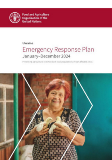
Ukraine: Emergency Response Plan, January–December 2024
05/2024
The war in Ukraine continues to compound the vulnerabilities of rural communities, especially those living near the frontline. Rural communities are increasingly becoming food aid beneficiaries and nearly one‑third of planned food aid beneficiaries under the 2024 Humanitarian Response Plan are rural people who traditionally produce their own food. In this context, the Food and Agriculture Organization of the United Nations (FAO) has developed the 2024 Emergency Response Plan (ERP).
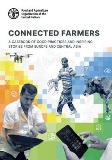
Connected farmers: A casebook of good practices and inspiring stories from Europe and Central Asia
05/2024
This casebook unfolds the stories of 25 farmers and agripreneurs who have successfully embraced digital technologies. The accounts presented here reveal that, opportunities for innovation and resilience can be found. The case studies presented here, grouped into five distinct use cases, illustrate the transformative power of digitalization in agriculture, and serve as tangible examples of the successes and lessons learned on the path to sustainable development.
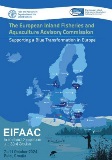
The European Inland Fisheries and Aquaculture Advisory Commission – Supporting a Blue Transformation in Europe 2024
05/2024
This 2024 document of the European Inland Fisheries and Aquaculture Advisory Commission (EIFAAC) describes progress made by EIFAAC in 2023 and 2024 towards implementing its workplan and showcases news from EIFAAC Members, such as new policies, new legislation, new studies, and innovations in aquaculture and inland fisheries production and management.
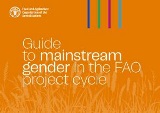
Guide to mainstream gender in the FAO project cycle
04/2024
This is an updated version of the 2017 Guide to mainstreaming gender in the FAO project cycle. It provides project formulators with practical guidance and tools to implement the gender related requirements established in the different phases of the FAO project cycle, and to support the formulation of projects and programs that contribute to advancing gender equality and women’s empowerment in agrifood systems, as foreseen by FAO’s mandate.

Europe and Central Asia gender newsletter, May 2024 – Issue #14
05/2024
In this issue of the FAO Europe and Central Asia Gender Newsletter, we provide an overview of the latest stories, including the United Nations Regional Forum on Sustainable Development, International Women’s Day celebrations, the Country Gender Assessment workshop in Albania, and expert insights from Albania, Georgia and Türkiye.
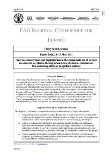
The role of innovation and digitalization in the sustainable use of natural resources to accelerate the implementation of climate-resilient and low-emission pathways in agrifood systems - ERC 24/2
05/2024
This background document examines the central role of innovation and digitalization in advancing the realization of climate-resilient and low-emission pathways within agrifood systems. It emphasizes their significance in enabling and catalysing sustainable natural resource management, it outlines recommendations for FAO, serving as a strategic guide for harnessing the full potential of innovation and digitalization.

Digital Villages in Tajikistan
05/2024
The flyer details the activities that are ongoing as part of the digital Villages initiative in Tajikistan. Digital Villages enhance rural resilience and food security by providing farmers with digital tools for accessing inputs, market information, and alternative sales channels online.
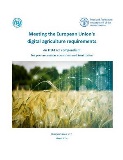
Meeting the European Union's digital agriculture requirements
05/2024
The ITU Office for Europe and the FAO Regional Office for Europe and Central Asia co-authored this document to serve primarily as a compendium supporting the entry of EU pre-accession countries to the EU single market and the alignment of their agricultural policies with the emerging EU legislation related to digital agriculture, and more specifically, the CAP and its delivery.
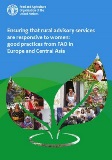
Ensuring that rural advisory services are responsive to women: good practices from FAO experiences in Europe and Central Asia
04/2024
This report builds upon FAO’s work promoting gender mainstreaming in extension and advisory services, cataloguing challenges and suggesting strategies for increasing the gender responsiveness of rural advisory services globally. The purpose of this review is to apply FAO’s accumulated knowledge about gender equality in the context of rural advisory services to assess the situation in the Europe and Central Asia region.

Enhancing diets and resilience
04/2024
This report presents the results of a mixed-method rapid assessment that provides both indicative quantitative information and in-depth qualitative analysis on the household-level impacts of the Cash+ pilot. The aim of this study is to evaluate the impacts of the pilot on beneficiaries, in particular on their diets, agricultural activities, income generation and poverty reduction and its potential for poverty reduction through a scale up of similar support.

Integrated land use management systems in Uzbekistan – Part 2
03/2024
This report aims to describe and analyse the economic and business aspects of agroforestry implementation in Uzbekistan. This information is presented to enable the development of detailed and specific suggestions for land use contract development.
.tmb-th600x450.jpg?Culture=en&sfvrsn=210cc7ff_1)
Europe and Central Asia Gender Newsletter
03/2024
Each issue of FAO Europe and Central Asia Gender Newsletter explores and discusses women’s and men’s experiences in agriculture and food security in the region. This issue reports on the latest developments in gender equality and women's empowerment through the celebration of the International Day of Rural Women in the region, the 43rd session of the European Commission on Agriculture, FAO activities and projects in the Western Balkans and regional workshops organised in Georgia and Türkiye.

FAO in Europe and Central Asia 2023
03/2024
FAO’s work globally and in the Europe and Central Asia region is guided by the FAO Strategic Framework 2022–2031, which articulates the Organization’s vision of a sustainable and food-secure world for all. With the Strategic Framework and the four betters as a lens, this report reviews and describes the project and the programme work of the Organization at the regional level and in each of the FAO programme countries of the region.

Science–Policy Interface in action #1
03/2024
The brochure delves into the critical interface between science and policy within the agrifood system, emphasizing its role in driving transformation, resilience, and food security. It highlights the importance of Science–Policy Interfaces (SPIs) in translating scientific discoveries into actionable policies and practices.
.tmb-th600x450.jpg?Culture=en&sfvrsn=8c7fecdb_3)
Digital Villages In Europe and Central Asia
01/2024
The Digital Village Initiative aims to transform rural life in Europe and Central Asia by deploying digital technologies. This project focuses on three key objectives: deliver increased agricultural productivity by introducing advanced technologies to farmers; connect rural communities through digital platforms that enhance access to essential services, and foster sustainable and resilient rural economies for long-term growth and prosperity.
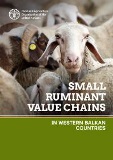
Small ruminant value chains in Western Balkan countries
01/2024
The report delineates four principal market channels for small ruminant milk and three for small ruminant meat that farmers utilize for product commercialization. Albanian small ruminant farmers predominantly focus on milk production, while their counterparts in Serbia, Montenegro, and Bosnia and Herzegovina are inclined towards meat production.

Measuring the state of food safety in Belgium with a food safety barometer
01/2024
This publication document discusses the development and implementation of a food safety barometer in Belgium. The purpose of the barometer is to measure the state of food safety in the country and enable evidence-informed risk management and policy decisions. The barometer consists of 30 indicators that cover various aspects of food safety from farm to fork.
055033316b184760ac1014117ea0254d.tmb-th600x450.jpg?Culture=en&sfvrsn=a62a48e8_3)
Promoting sustainable and circular bioeconomy through agriculture practice in Eastern Europe and Central Asia
12/2023
This report presents an overview of concepts related to bioeconomy and the benefits of their implementation in agriculture and shares agriculture production trends, bioeconomy initiatives and sustainable agriculture approaches from throughout the Eastern Europe and Central Asia region.
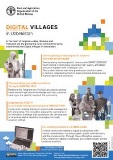
Digital Villages in Uzbekistan
01/2024
In Uzbekistan's Ferghana Valley, the rural communities of Novkent and Yuksalish are at the forefront of a remarkable transformation into Digital Villages. This leaflet explores how these areas are harnessing technology to revolutionize agriculture and empower youth.
